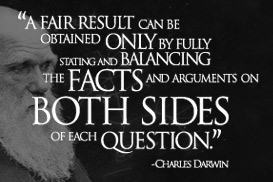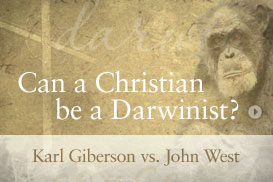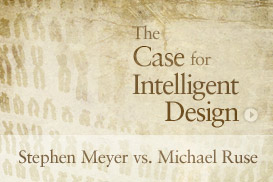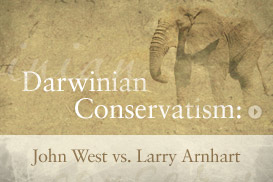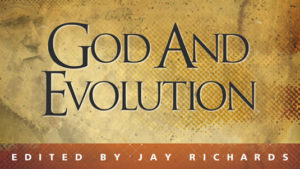Was Darwin Wrong?
Was Darwin Wrong?
In public debates over evolution, supporters of the theory often insist that “there is no scientific evidence critical of evolution,” while critics of the theory contend that there are growing scientific challenges to modern evolutionary theory. Who is right? In the following essays, you can explore the debate over the scientific evidence for Darwinian evolution through the writings of leading supporters and critics of Darwin’s theory.
Was Darwin Wrong?
David Quammen
In a cover story for National Geographic, science writer David Quammen presents an overview of what he calls the “overwhelming evidence” leading to “the certainty that Darwin was right.”
Ignoring The Flaws in Darwin’s Theory
Jonathan Wells
Biologist Jonathan Wells responds to David Quammen’s National Geographiccover story by arguing that “the evidence Quammen presents for Darwin’s theory falls far short of confirming it.” Indeed, “given the evidence, any rational person is justified in doubting the truth of Darwin’s theory.”
Why Evolution is True
Jerry Coyne
Critiquing an article in Forbes.com by neurosurgeon Michael Egnor, evolutionary biologist Jerry Coyne at the University of Chicago claims that “[t]here is so much evidence and so many kinds of evidence” for Darwinian evolution “that one would have to be either willfully ignorant or blinded by faith to think otherwise.”
My Reply to Jerry Coyne: Why Darwinism is False
Michael Egnor
Responding to evolutionary biologist Jerry Coyne, neurosurgeon Michael Egnor of Stony Brook University writes that “Coyne’s defense of Darwinism ignores recent scientific evidence” and adds that “there isn’t a single detailed, evidence-based explanation for the evolution of any biomolecule from primordial precursors. All Darwinists have to offer are ‘just-so’ stories about how biomolecules might have originated.”
The Dangers of Overselling Evolution
Philip S. Skell
National Academy of Sciences member Philip Skell criticizes biologist Jerry Coyne for overselling the importance of Darwin’s theory to modern science. According to Skell, “the rhetorical approach of scientists such as Coyne unnecessarily polarizes public discussions and—even more seriously—overstates both the evidence for Darwin’s theory of historical biology and the benefits of Darwin’s theory to the actual practice of experimental science.”
Waiting for Two Mutations: Exposing the Flaws of Behe’s Argument about the Limits of Darwinian Evolution
Rick Durrett and Deena Schmidt
Drawing on experimental data involving mutations, mathematicians Rick Durrett and Deena Schmidt seek “to expose flaws in some of Michael Behe’s arguments concerning mathematical limits to Darwinian evolution.”
Bold Biology: How Durrett and Schmidt Exposed the Inadequacy of Neo-Darwinism
Douglas Axe
Molecular biologist Douglas Axe argues that Durrett and Schmidt, far from demonstrating the robustness of the Neo-Darwinian paradigm, show the extreme improbability of a Darwinian explanation for the major changes in the history of life. If one has to rely on the Darwinian mechanism, even tiny changes would consume so much time in evolutionary history that there would be no time left for the major changes to occur.
10 Answers to Jonathan Wells’s “10 Questions”
National Center for Science Education
The pro-evolution National Center for Science Education (NCSE) denounces biologist Jonathan Wells for recommending ten questions that students can ask their teachers about unresolved problems with the modern theory of evolution. According to the NCSE, Wells’s questions do not raise valid problems with evolution, and they are “insidious” because they “try to encourage students to doubt and distrust evolutionary theory.”
Inherit The Spin: Darwinists Answer “Ten Questions” with Evasions and Falsehoods
Jonathan Wells
Biologist Jonathan Wells responds to the National Center for Science Education’s critique of his “Ten Questions to ask your biology teacher about evolution” by further documenting the problems with evolution and by arguing that the NCSE is misrepresenting the scientific record.
Tiktaalik: Convincing Evidence of an Evolutionary Transition from Fish to Tetrapods
National Academy of Sciences
In its book Science, Evolution and Creationism (2008), the National Academy of Sciences highlights the discovery of “a four-foot-long fossil with features intermediate between those of a fish and a four-legged land animal.” According to the Academy, this fossil of a creature dubbed the Tiktaalik provides strong evidence that fish evolved into land animals.
The Rise and Fall of Tiktaalik? Darwinists Admit “Quality” of Evolutionary Icon is “Poor” in Retroactive Confession of Ignorance
Casey Luskin
Casey Luskin chronicles the rise and fall of the Tiktaalik fossil as evidence for the evolutionary transition between fish and land animals. Once touted by evolutionists as a premiere transitional fossil, the Tiktaalik’s image has begun to tarnish as it has come under closer scrutiny.
